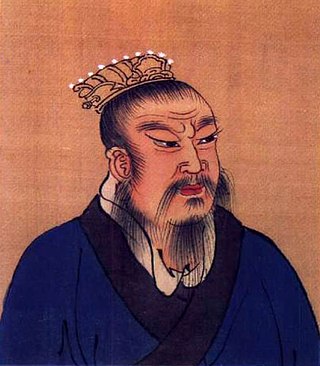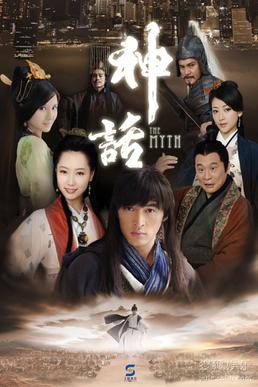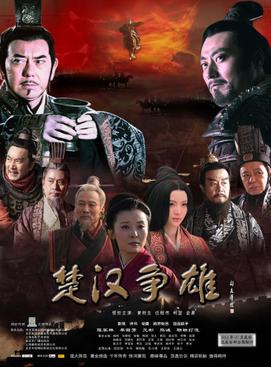Lü Zhi, courtesy name E'xu (娥姁) and commonly known as Empress Lü and formally Empress Gao of Han, was the empress consort of Gaozu, the founding emperor of the Han dynasty. They had two known children, Liu Ying and Princess Yuan of Lu. Lü was the first woman to assume the title Empress of China and paramount power. After Gaozu's death, she was honoured as empress dowager and regent during the short reigns of Emperor Hui and his successors Emperor Qianshao of Han and Liu Hong.

Emperor Gaozu of Han, also known by his given name Liu Bang (劉邦), was the founder and first emperor of the Han dynasty, reigning from 202 to 195 BC. He is considered by traditional Chinese historiography to be one the greatest emperors in history, credited with establishing the Pax Sinica, one of China's longest golden ages.

Emperor Hui of Han, born Liu Ying (劉盈), was the second emperor of the Han dynasty. He was the second son of Emperor Gaozu, the first Han emperor, and the only son of Empress Lü from the powerful Lü clan. Emperor Hui is generally remembered as a somewhat weak character dominated and terrorized by his mother, Empress Lü, who became Empress Dowager after she encouraged her husband to command personally the war against Ying Bu, in which he died eventually from an arrow wound sustained during the war.

Zhang Liang, courtesy name Zifang, was a Chinese military strategist and politician who lived in the early Western Han dynasty. He is also known as one of the "Three Heroes of the early Han dynasty" (漢初三傑), along with Han Xin (韓信) and Xiao He. Zhang Liang contributed greatly to the establishment of the Han dynasty. After his death, he was honoured with the posthumous title "Marquis Wencheng" by Emperor Qianshao. Zhang Liang is depicted in the Wu Shuang Pu by Jin Guliang.

The Chu–Han Contention (楚漢相爭), also known as the Chu–Han War (楚漢戰爭), was an interregnum period in Imperial China between the fall of the Qin dynasty and the establishment of the Western Han dynasty. After the third and last Qin ruler, Ziying, unconditionally surrendered to rebel forces in 206 BCE, the former Qin Empire was divided by rebel leader Xiang Yu into the Eighteen Kingdoms, which were ruled by various rebel leaders and surrendered Qin generals. A civil war soon broke out, most prominently between two major contending powers – Xiang Yu's Western Chu and Liu Bang's Han. Some of the other kingdoms also waged war among themselves but these were largely insignificant compared to the main conflict between Chu and Han. The war ended in 202 BCE with a Han victory at the Battle of Gaixia, during which Xiang Yu committed suicide after making a last stand. Liu Bang subsequently proclaimed himself emperor and established the Western Han dynasty.

Xiang Ji, courtesy name Yu, was the Hegemon-King of Western Chu during the Chu–Han Contention period of China. A noble of the Chu state, Xiang Yu rebelled against the Qin dynasty, destroying their last remnants and becoming a powerful warlord. He was granted the title of "Duke of Lu" (魯公) by King Huai II of the restoring Chu state in 208 BC. The following year, he led the Chu forces to victory at the Battle of Julu against the Qin armies led by Zhang Han. After the fall of Qin, Xiang Yu was enthroned as the "Hegemon-King of Western Chu" (西楚霸王) and ruled a vast area covering modern-day central and eastern China, with Pengcheng as his capital. He engaged Liu Bang, the founding emperor of the Han dynasty, in a long struggle for power, known as the Chu–Han Contention, which concluded with his eventual defeat at the Battle of Gaixia and his suicide. Xiang Yu is depicted in the Wu Shuang Pu by Jin Guliang.

The Feast at Swan Goose Gate, also known as the Banquet at Hongmen, Hongmen Banquet, Hongmen Feast and other similar renditions, was a historical event that took place in 206 BC at Swan Goose Gate outside Xianyang, the capital of the Qin dynasty. Its location in present-day China is roughly at Hongmenbao Village, Xinfeng Town, Lintong District, Xi'an, Shaanxi. The main parties involved in the banquet were Liu Bang and Xiang Yu, two prominent leaders of insurgent forces who rebelled against the Qin dynasty from 209 BC to 206 BC.

The Three Qins refer to three of the Eighteen Kingdoms, the short-lived power-sharing arrangement formed in 206 BC after the collapse of the Qin dynasty. The three kingdoms were located in Guanzhong Plain, the heartland of the Qin Empire.

Fan Kuai was a military general of the early Western Han dynasty. He was a prominent figure of the Chu–Han Contention, a power struggle for supremacy over China between the Han dynasty's founder, Liu Bang, and his rival, Xiang Yu.
The Battle of Gaixia was a last stand fought in December 203 BC during the Chu–Han Contention between the forces of Liu Bang and Xiang Yu. The battle concluded with victory for Liu Bang, who proclaimed himself Emperor and founded the Han dynasty. This is the last major battle of the Chu-Han Contention, ending with the suicide of Xiang Yu and the undisputed rule of Liu Bang.

The Story of Han Dynasty is a Chinese television series based on the events in the Chu–Han Contention, an interregnum between the fall of the Qin dynasty and the founding of the Han dynasty in Chinese history. The series was first broadcast on CCTV in China in 2003. Directed by Wei Handao, the series starred Hu Jun, Xiao Rongsheng, Jacklyn Wu, Kristy Yang, Wang Gang and Li Li-chun.

The Myth is a 2010 Chinese television series based on the 2005 Hong Kong film of the same title. Jackie Chan, who starred in the original film, was credited as the producer for the series, while Stanley Tong, who directed the film, was the creative director for the series. The series was first aired on CCTV-8 in China in January 2010.
Xiang Chan, courtesy name Bo, better known as Xiang Bo, was a noble of the Chu state of the Seven Warring States. He was an uncle of the warlord Xiang Yu, who competed with Liu Bang, the founder of the Han dynasty, for supremacy over China in the Chu–Han Contention.

The Great Conqueror's Concubine, alternatively known as King of Western Chu, is a Hong Kong historical drama film directed by Stephen Shin and Wei Handao, starring Ray Lui, Rosamund Kwan, Zhang Fengyi and Gong Li. The film is based on the events in the Chu–Han Contention, an interregnum between the fall of the Qin dynasty and the founding of the Han dynasty.
The Battle of Pengcheng was fought in Pengcheng in April 205 BC between the kingdoms of Western Chu and Han, led by Xiang Yu and Liu Bang respectively. The Han forces were unprepared and suffered heavy losses. Several of Liu Bang's family members were captured and some of his allies defected to Chu as a result of his defeat.

King's War, also known as Legend of Chu and Han, is a Chinese television series based on the events in the Chu–Han Contention, an interregnum between the fall of the Qin dynasty and the founding of the Han dynasty. It started airing on Anhui TV, Zhejiang TV, Jiangxi TV and Tianjin TV on 28 December 2012.

Chen Ping was a Chinese politician who served as a chancellor in the early Western Han dynasty. He was an advisor to Liu Bang, the founding emperor of the Han dynasty. He played an important role in helping Liu Bang overcome his rival, Xiang Yu, in the Chu–Han Contention.

Chu Han Zhengxiong is a Chinese television series directed by Chen Jialin. The plot, based on the historical novel of the same Chinese title by Xiong Cheng (熊誠), retells the events in the Chu–Han Contention, an interregnum between the fall of the Qin dynasty and the founding of the Han dynasty. Shooting for the series started in October 2011 at the Jiaozuo Film and Television City. It was released in China on 27 November 2012.

The Last Supper is a 2012 Chinese historical film directed by Lu Chuan. The plot is based on events in the Chu–Han Contention, an interregnum between the fall of the Qin dynasty and the founding of the Han dynasty in Chinese history. The film was originally scheduled to be released on 5 July 2012, but was delayed. It premiered at the Toronto International Film Festival on 8 September 2012.
Zhang Cang 張蒼 was a Chinese military general, philosopher, and politician during the Western Han dynasty. He was the representative thinker of the Yin-Yang School, as well as a Confucian scholar, army general and prime-minister under Liu Bang. Evidence on his life is contained in the Book of Han and some other sources.















